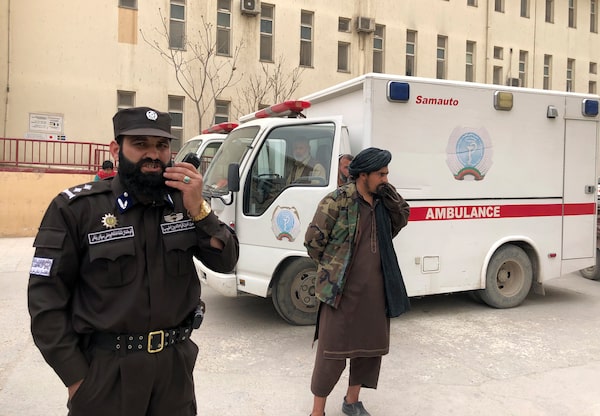
Taliban fighters stand guard outside the hospital after a bomb blast in Mazar-e Sharif, the capital city of Balkh province, in northern Afghanistan, on Mar. 9.Abdul Saboor Sirat/The Associated Press
An explosion ripped through the headquarters of the governor of the northern Afghan province of Balkh on Thursday, killing the Taliban-appointed senior official who had played a major role in the weakening of Islamic State’s local branch, known as ISKP in Afghanistan.
Governor Mohammad Daud Muzamil is the top Taliban figure to have lost his life in such an incident since the Islamists swept to power in August of 2021 following the exit of U.S.-led troops from Afghanistan.
“With regret, we learned that the governor of Balkh, Mohammad Daud Muzamil, was killed by the enemies of Islam in an explosion,” Zabihullah Mujahid, the Taliban’s senior spokesman, said in a statement.
He gave no further details. The Taliban usually consider ISKP as an enemy of Islam. ISKP – or the Islamic State in Khorasan Province – is a rival militant group of the Taliban and consists of latter’s breakaway members and foreign insurgents. Both groups have been involved in deadly clashes in various parts of Afghanistan before the Taliban ascended to power.
A source connected to the Taliban told The Globe and Mail that a suicide bomber was behind the attack. He said the bomber blew up explosives attached to his body as he greeted Mr. Muzamil in the corridor of the two-storied complex. Two other people were also killed and 20 wounded, the source added. The Globe is not identifying him because he is not authorized to speak on security matters.
While leading insurgency against the former government and U.S.-led troops, the Taliban themselves targeted the then-administration’s officials using tactics similar to the ones that ISKP is now employing.
Islamic State claimed responsibility for Thursday’s attack, the group’s Amaq agency reported.
It follows a series of Taliban operations in recent months against ISKP in Kabul, Balkh and elsewhere, that have resulted in the killing of some senior figures of the network.
Mr. Muzamil served as a key Taliban field commander in southern Helmand during the 20-year occupation of Afghanistan. He fought against U.S. and British troops and also played a key role in the annihilation of ISKP in that province when it first emerged in 2015.
After the Taliban seized power in 2021, Mr. Muzamil was appointed as the Taliban’s governor in eastern Nangahar, long regarded as the headquarter of ISKP, and he conducted a wave of operations that led to the killing and arrests of reportedly hundreds of men accused of being affiliated to ISKP.
Some months ago, he became the Taliban’s governor for the strategic Balkh province, which lies near the border with Central Asia and from where IKSP launched several rocket strikes against Uzbekistan last year.
Some Taliban sympathizers on social media accused ISKP of killing Mr. Muzamil.
“It looks very likely that the Daesh [ISKP] may have carried out this attack and if so, then this will boost morale among Daesh,” Sami Yousafzai, an Afghan journalist who knows key Taliban leaders and covered the Afghan war extensively, told The Globe.
“At the same time, it seems that Daesh has infiltrated in Taliban ranks and created some cells that can be a challenge for the Taliban and create mistrust among them. The attack can also be a blow to the Taliban’s long claim of have brought security to Afghanistan,”.
U.S. and UN officials estimate that up to 6,000 ISKP fighters, including foreign militants, are active in Afghanistan and can be regarded as a challenge for the Taliban, who face internal division over key policies that have prompted the world to not recognize the regime’s hard-line government and irked ordinary Afghans.
With a report from Reuters
This story was produced in partnership with Journalists for Human Rights with funding from Meta Journalism Project